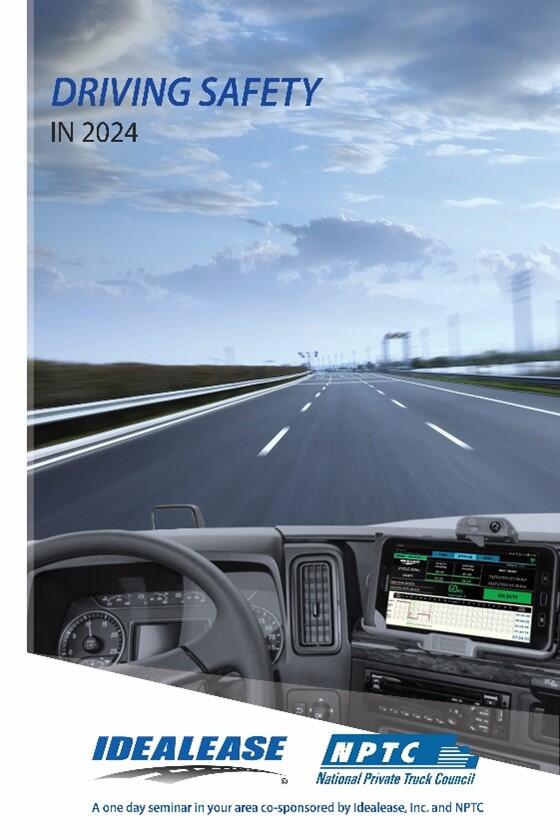An Aging Driver Force
Check out the newest Idealease Bulletin! It delves into the pressing issue of the aging trucking workforce and offers valuable insights on how we can tackle this challenge head-on. Subscribe to receive the latest safety bulletins straight to your inbox.
In this issue:
- May is National Bicycle Safety Month
- Do I Need a Special License for a Straight Truck Under 26,001 Lbs. with Air Brakes?
- Security Concerns: Disqualifications for a Hazmat Endorsement
- Buckle Up and Drive Safe: CVSA Announces Operation Safe Driver Week
- FMCSA Hosts 2024 Safety Research Forum
- CVSA’s International Roadcheck Is Scheduled for May 14-16
- Registration Now Open for the 2024 Idealease/NPTC Safety Seminars!
The Greying Grid: Challenges and Solutions in an Aging Trucking Workforce
The trucking industry is on the brink of a "perfect storm" due to an impending driver shortage that is expected to exacerbate. This shortage is attributed to various factors, with the aging driver population being a significant contributor.
A Workforce With Silver Temples
The average age of truck drivers in the US is over 50, with a significant increase in the number of drivers aged 55 and above. While some companies emphasize the safety record of experienced drivers, it's important to recognize that physical and mental capabilities decline at varying rates for individuals.
Unlike pilots who are subject to FAA regulations, there are no specific age restrictions for commercial truck drivers set by the FMCSA. This raises the critical question for transportation managers: how can we determine when a driver is no longer fit to operate a truck safely?
To address this challenge proactively, here are some steps we can consider:
Please remember the following guidelines for safety and loss control programs:
- Develop comprehensive safety and loss control programs with unbiased policies that are suitable for all ages.
- Require all drivers to undergo annual physical examinations by FMCSA-registered medical examiners familiar with your company.
- Create clear job descriptions outlining the essential physical and mental demands of each driving position.
- Implement annual defensive driver training programs to keep skills sharp.
- Conduct annual check rides to assess driver capabilities.
- Maintain open communication channels with drivers to discuss their ability to safely perform their duties.
- Remain vigilant and observe the actions of all drivers to identify any potential safety concerns.
May is National Bicycle Safety Month
Sure, here is a simplified version of the text:
Lots of people ride bikes every day in America. It's good for the environment, good for your health, and cheaper than driving a car. This May, the NHTSA wants everyone to be careful and look out for people on bikes when they're driving. They also want people on bikes to be safe and always wear a helmet. Bike safety is important all the time, but we're focusing on it even more this month for National Bicycle Safety Month.
In 2022, there were 1,105 people on bikes who died and around 46,195 who got hurt. You can find more information about our campaign materials by clicking here.
Thank you for supporting bike safety!
Do I Need a Special License for a Straight Truck Under 26,001 Lbs. with Air Brakes?
This question frequently comes up in our seminars and from our rental and lease teams. Here's a breakdown:
Federal CDL Requirements:
In the United States, a Commercial Driver's License (CDL) is only required for specific types of commercial motor vehicles (CMVs) as defined by federal regulations (CFR 383.5). These CMVs fall into four categories:
- Large Vehicles: A combined weight (including trailers) exceeding 26,001 pounds (gross combination weight rating or GCWR) where the towed unit weighs more than 10,000 pounds.
- Heavy Straight Trucks: A single truck with a weight rating exceeding 26,001 pounds (gross vehicle weight rating or GVWR).
- Passenger Buses: Vehicles designed to carry 16 or more passengers (including the driver).
- Hazmat Transporters: Vehicles of any size used to transport hazardous materials as defined by regulations.
So, for straight trucks under 26,001 lbs. GVWR, the answer is generally NO, you don't need a CDL.
Important State Variations:
However, some states may have additional licensing requirements for specific weight ranges. For example, Michigan and Illinois might require a chauffeur's license for straight trucks between 10,000 and 26,001 lbs. GVWR. It's always best to check with your state's Department of Motor Vehicles (DMV) for any additional licensing needs.
Air Brakes and Your CDL:
There's no separate "air brake endorsement" on a CDL. If your CDL has an "air brake restriction," it means you either failed the air brake knowledge test or used a non-air brake vehicle during your skills test. This restriction limits you from operating vehicles with air brakes.
Security Concerns: Disqualifications for a Hazmat Endorsement
Obtaining a Hazmat endorsement on your CDL requires passing a security threat assessment. This ensures you're entrusted with transporting hazardous materials responsibly. Here's what could disqualify you:
Serious Crimes:
- Terrorism, Espionage, Sedition, or Treason
- Murder, Assault with Intent to Murder, or Kidnapping
- Rape, Aggravated Sexual Abuse, Extortion, or Robbery
- Arson, Bribery, Smuggling, or RICO violations
- Unlawful Possession/Use of Explosives, Firearms, or Weapons
- Drug Distribution/Possession or Identity Theft
- Crimes related to Transportation Security Incidents
- Improper Hazmat Transportation
Attempted Crimes:
- Conspiracy or Attempts to commit any of the above offenses
Recommendation:
- Begin the Security Threat Assessment process 90 days before your Hazmat endorsement expires.
Start Your Assessment Here:
- TSA Hazmat Endorsement: https://www.tsa.gov/for-industry/hazmat-endorsement
Buckle Up and Drive Safe: CVSA Announces Operation Safe Driver Week
The Commercial Vehicle Safety Alliance (CVSA) is calling on all drivers to buckle up and hit the road responsibly during Operation Safe Driver Week, happening July 7th through 13th, 2024.
This nationwide campaign aims to improve road safety for everyone by cracking down on risky driving behaviors and promoting safe driving practices among both commercial truck drivers and passenger vehicle drivers.
Focus on Speeding and Distractions
Law enforcement will be out in force during the week, targeting drivers who speed, get distracted behind the wheel, or drive under the influence. Here are some sobering statistics from CVSA to highlight the dangers:
- Speeding is a major factor – it's been present in over a quarter of all crash deaths since 2008.
- Distracted driving claimed over 3,100 lives in 2019 alone.
Seat Belts Save Lives
Wearing a seat belt is your best defense in a crash. In 2019, nearly half of all passenger vehicle occupants killed weren't buckled up. Seat belts have saved countless lives, and CVSA emphasizes their importance in preventing further tragedies.
Mark Your Calendar: International Roadcheck Up Next
Remember to mark your calendars! After Operation Safe Driver Week, CVSA will hold its annual International Roadcheck from May 14th to 16th, 2024. This is a significant effort across the US, Canada, and Mexico to ensure that trucks and buses are safe for the roads. They'll check things like brakes and ensure drivers aren't using alcohol or drugs. It's all about making the roads safer for everyone. Let's all drive safely and ensure we get where we're going in one piece!
FMCSA Hosts 2024 Safety Research Forum
The 2024 Safety Research Forum, organized by the Federal Motor Carrier Safety Administration (FMCSA) of the U.S. Department of Transportation, will be held online on April 24 and April 25, 2024, from 1:00 to 4:00 PM ET each day. The event will feature presentations from different divisions focusing on safety analysis, crash data analytics, applied research, and advanced technology. The forum aims to highlight the important work of FMCSA's Office of Research, with staff members giving brief overviews of their impactful projects. The lineup of speakers includes notable figures from FMCSA and the National Transportation Safety Board.
Registration is mandatory for participation, and attendees are encouraged to submit any questions in advance to SRForum@dot.gov.
Event Details: What: FMCSA 2024 Safety Research Forum
Date/Time: Wednesday, April 24, 2024, 1:00pm – 4:00pm Eastern Thursday, April 25, 2024, 1:00pm – 4:00pm Eastern
Registration: Click here Agenda: https://www.fmcsa.dot.gov/research-and-analysis/fmcsa-2024-safety-research-forum

Registration Now Open for the 2024 Idealease/NPTC Safety Seminars!
Driving Safety in 2024
Idealease and the National Private Truck Council (NPTC) are excited to announce the opening of registration for the 2024 Safety Seminars. These one-day seminars will focus on crucial topics such as safety data analysis, basic safety and compliance, regulation changes, and CSA.
Who Can Attend: These seminars are open to all Idealease customers, potential customers, and NPTC members, and are provided at no charge.
Seminar Highlights:
- Gain insights into safety practices and compliance regulations.
- Learn about the latest advancements in safety technology.
- Understand CSA (Compliance, Safety, Accountability) and its impact on your operations.
Why Attend: Whether you're a novice or experienced transportation professional, these seminars offer valuable information to enhance your safety practices.
Registration Details: Seminars are currently available for registration, with venues secured for the following locations:
Spring 2024
- 4/10/24: Sun Prairie, WI
- 4/18/24: Frankfort, KY
- 5/9/24: Tampa, FL
- 5/21/24: Portland, OR
- 5/23/24: Santa Rosa, CA
Fall 2024
- 10/1/24: Eugene, OR
- 10/3/24: San Leandro, CA
- 10/9/24: Baltimore, MD
Note: If you don't see a seminar in your area listed yet, don't worry. Registration availability will be updated weekly as venues are secured. Keep an eye on this bulletin for the latest updates.
To register for an upcoming seminar in 2024, click on the following link: Safety Seminar Registration. Don't miss out on this opportunity to enhance your safety knowledge and practices in 2024. Register today!

CVSA’s International Roadcheck Is Scheduled for May 14-16
The Commercial Vehicle Safety Alliance’s (CVSA) International Roadcheck is scheduled for May 14-16. International Roadcheck is a three-day, high-visibility initiative across Canada, Mexico, and the United States, focusing on commercial motor vehicle inspection and regulatory compliance enforcement.
CVSA-certified law enforcement personnel will inspect commercial motor vehicles and drivers at weigh/inspection stations, temporary sites, and mobile patrols to ensure compliance with federal, state, provincial, or territorial regulations. Data collected during the 72-hour period will be analyzed and results released this summer.
This year, International Roadcheck will spotlight two areas: tractor protection systems and alcohol and controlled substance possession. Controlled substance and alcohol use remains a significant concern, with an increasing number of prohibited drivers listed in the U.S. Drug and Alcohol Clearinghouse (DACH), posing a threat to road safety.
Focusing on tractor protection systems aims to raise awareness among drivers, motor carriers, technicians, and enforcement personnel regarding critical vehicle components such as the tractor protection valve, trailer supply valve, and anti-bleed back valve. These components, often overlooked during inspections, are crucial for safety. To aid in proactive assessment and maintenance, CVSA has provided an inspection bulletin outlining the steps for proper checks, available in French and Spanish.
During International Roadcheck, inspectors will conduct routine North American Standard Level I Inspections, a comprehensive 37-step procedure examining vehicle components and driver documentation.
For more information on Roadcheck 2024, visit: [https://www.cvsa.org/news/2024-international-roadcheck/]
*The Idealease Safety Bulletin is provided for Idealease locations and their customers and is not to be construed as a complete or exhaustive source of compliance or safety information. The Idealease Safety Bulletin is advisory in nature and does not warrant, guarantee, or otherwise certify compliance with laws, regulations, requirements, or guidelines of any l
s.
